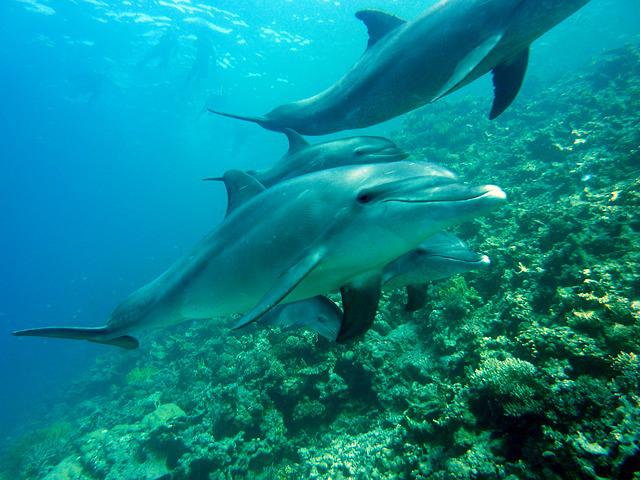Corals may contain substances that assist mammals to maintain healthy skin or treat infections.
Wildlife biologist Angela Ziltener of the University of Zurich saw Indo-Pacific bottlenosed dolphins doing something interesting on her deep-sea dives. The dolphins (Tursiops aduncus) would form a line and take turns brushing their bodies against the seafloor's corals and sea sponges. After more than a decade as an "adopted" member of the pod, which allowed Ziltener and her crew to get up close to the animals without upsetting them, they think they've figured out why they act like this: the dolphins may use corals and sea sponges as their own private pharmacies.
The invertebrates produce antibacterial compounds, as well as antioxidant and hormone components, which are likely discharged into the waters of the Northern Red Sea when dolphins come into contact, according to Ziltener and colleagues in iScience on May 19. As a result, rubbing may aid in the maintenance of healthy skin in dolphins.
Members of the pod were seen swimming through corals as if they were a bath brush, rubbing various regions of their bodies, according to Ziltener. It is frequently a quiet social gathering. "It's not like they're battling for the turn," Ziltener explains. "No, they wait a while and then proceed." Other times, a single dolphin will come on its own at a patch of coral.
But, according to Ziltener, the dolphins won't just rub up against any coral. They prefer gorgonian corals (Rumphella aggregata) and leather corals (Sarcophyton sp.), as well as a type of sea sponge (Ircinia sp.).
One-centimeter slices of wild corals and sponges were studied by Ziltener and colleagues. Overall, the scientists discovered 17 compounds, with 10 of them having antibacterial or antimicrobial properties. According to coauthor Gertrud Morlock, an analytical chemist at Justus Liebig University Giessen in Germany, it's plausible that the substances protect the dolphins from skin irritations or infections as they swim through the corals.
Other species, such as chimps, have the ability to self-medicate (SN: 11/3/90). According to Florida International University marine researcher Jeremy Kiszka, the latest study convinces him that dolphins are exploiting corals and sea sponges for this reason. However, he claims that more research is needed to verify the link. For example, lab testing could assist identify the bacterium kinds that the chemicals would be effective against.
There's still work to be done, according to Ziltener. She says it's plausible that dolphins use corals and sea sponges to treat active skin illnesses in addition to prevention, but the team has yet to see proof of a coral cure. The next step, according to Ziltener, is to see if dolphins prefer to rub specific body parts on specific corals in an "underwater spa."
Source :
G. Morlock et al. Evidence that Indo-Pacific bottlenose dolphins self-medicate with invertebrates in coral reefs. iScience. Published online May 19, 2022. DOI: 10.1016/j.isci.2022.104271.

